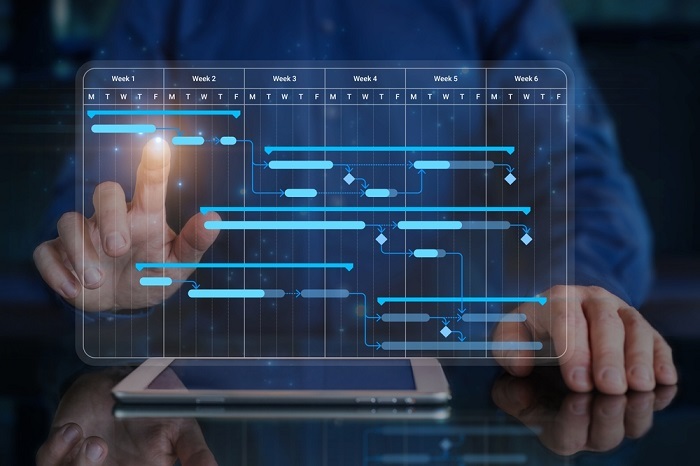
 Data Structure
Data Structure Networking
Networking RDBMS
RDBMS Operating System
Operating System Java
Java MS Excel
MS Excel iOS
iOS HTML
HTML CSS
CSS Android
Android Python
Python C Programming
C Programming C++
C++ C#
C# MongoDB
MongoDB MySQL
MySQL Javascript
Javascript PHP
PHP
- Selected Reading
- UPSC IAS Exams Notes
- Developer's Best Practices
- Questions and Answers
- Effective Resume Writing
- HR Interview Questions
- Computer Glossary
- Who is Who
How Can Project Managers Ensure Successful Project Delivery Within Time and Budget Constraints?
Planning for a project's completion is an integral part of project management. Planning projects well guarantees they will be finished on time and under budget.

This article covers a wide range of topics related to project planning, including but not limited to developing feasible timelines and budgets; assigning priorities to tasks and goals; tracking and managing project progress; using effective communication strategies; addressing and mitigating potential problems; leading teams effectively; managing risks and issues; fostering collaboration and ensuring high quality; and more.
Project managers can plan and carry out projects with greater success if they have a firm grasp of these essentials. This allows them to provide stakeholders with the high-quality outcomes they expect.
Importance of Planning for Successful Project Delivery
Effective project planning is crucial to delivering projects on time and within budget. Approximately half of all projects end up being completed on time and under budget. This emphasizes the significance of good planning in ensuring successful project outcomes.
Goals, objectives, scope, timeline, budget, and resources needed to complete a project are all elements that must be considered when planning a project. Project managers can better anticipate and respond to challenges when they have a solid plan in place.
Planning a project well also guarantees that everyone involved is on the same page and knows what they must do to help the project succeed. Project managers can lessen the likelihood of misunderstandings and conflicts that could otherwise slow down the project's completion by communicating the plan to all stakeholders.
Creating Realistic Project Schedules and Budgets
Creating Realistic Project Schedules and Budgets is a crucial aspect of project management that can significantly impact the success of a project. A study found that projects with clearly defined timelines and budgets were 70% more likely to succeed.

Managers should make a list of everything that needs to be done to finish the project, as well as an estimate of how long each task will take. They should also take into account any connections between tasks and anticipate any obstacles that may arise.
Similarly, project managers should account for all of the costs that will be incurred by the project when developing a realistic budget. All expenses, both direct (like labor and materials) and indirect (like overhead and administration), are included.
Prioritizing Project Tasks and Goals
Prioritizing project tasks and goals is crucial to meeting deadlines and staying within budget. This involves figuring out which activities and objectives are most crucial and should be completed first, and which ones can wait or be scrapped altogether.
A work breakdown structure (WBS), critical path analysis (CPA), and the Eisenhower matrix are just a few of the tools and techniques available to project managers for prioritizing tasks and achieving project goals.
Project managers can better allocate resources to the most important parts of a project if they first establish which parts are most important. This can help avoid setbacks, save money, and finish the project on schedule.
Monitoring and Controlling Project Progress
The timely and cost-effective completion of any project depends on careful monitoring and control of the project's progress. It entails keeping tabs on the project's development and comparing actual results to the estimated timeline and budget. This allows project managers to spot problems that could compromise the project's outcome and take steps to fix them. Project managers' ability to track and manage tasks is crucial for meeting deadlines, staying on budget, and producing work that meets quality standards.
Effective Communication Strategies in Project Management
Open and honest lines of communication are one of the cornerstones of any successful communication strategy. To achieve this goal, it is necessary to foster an atmosphere in which all team members feel safe voicing their opinions and where questions and clarifications are welcomed by all members.
Use simple, direct language as another useful tactic. Team members may not be familiar with technical jargon or other complex terms, so it's best to avoid their use. Instead, go for a language that is straightforward and easy to understand.
Daily stand-up meetings, weekly progress reports, and project status updates are just a few examples of the kinds of routine communications that should be established. The timely resolution of any issues or concerns depends on everyone being on the same page.
Managing Risks and Issues
Successful project delivery within time and budget constraints rely heavily on effective risk and issue management. Risk management is the process of anticipating and analyzing problems that may arise during a project, and then coming up with solutions to lessen or eliminate those problems.
In order to effectively manage risks, project managers must first identify all of the potential threats to the project and then rank them according to the likelihood and severity of each threat. They should also create backup plans in case something goes wrong, and make sure that everyone involved is aware of the risks and how they will be handled.
The sooner problems are addressed, the less of an impact they will have on the project as a whole. Managers of projects should have a system in place for dealing with problems as they arise. Sharing problems with stakeholders and keeping them updated on progress is also crucial.
Collaboration and Team Management
The timely and cost-effective completion of any given project depends heavily on effective collaboration and team management. Project managers need to establish open lines of communication, define specific responsibilities for each team member, and encourage regular status updates to ensure efficient teamwork. Building a strong team requires a positive atmosphere where members are encouraged to work together.
In order to manage a team effectively, you must communicate your expectations to them, give them what they need to succeed and train them in the skills they'll need to do their jobs. Team members can improve their performance and accomplish more with regular feedback and coaching.
Quality Control and Assurance
Project management features like quality assurance and control are essential to delivering projects on time and within budget.
Quality Control is the process of keeping an eye on a job to make sure it's getting done the way it's supposed to. It also includes performing quality assurance tests to make sure the final products are up to par.
Assuring that a project is being carried out in accordance with the quality standards established by the organization is what quality assurance is all about. Improving these procedures on a regular basis is also essential for high-quality project completion.
Continuous Learning and Improvement in Project Management
The goal of project managers who commit to a culture of continuous learning and improvement is to improve their effectiveness in leading projects toward successful outcomes. Project managers who practice continuous learning and improvement increase the likelihood that their projects will be completed on time and within budget. To do so, one must examine completed projects for lessons learned and then modify existing methods of project management accordingly.
Project managers' abilities to foresee and resolve issues, streamline procedures, and bring in projects successfully and efficiently can all be enhanced through ongoing training and education.

